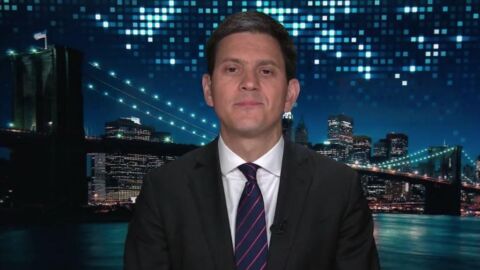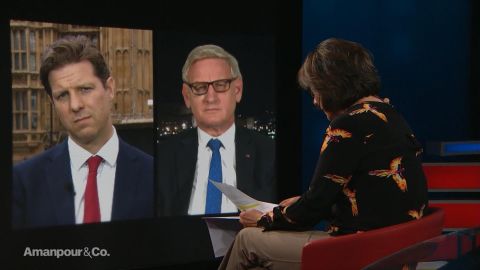Read Transcript EXPAND
FRASER NELSON, EDITOR, THE SPECTATOR: She had given everything trying to get a deal from the E.U. that Parliament would find acceptable, and I don’t think anybody can say that she didn’t try enough. She tried the vote three times and still those two ends quite close in the end but didn’t quite meet. So, there is therefore no option if the E.U. won’t make any more concessions to try to come up — to get — let somebody else try with the union negotiation, perhaps even with the new European commission. Because let’s remember, Europe went to the polls yesterday, the results of this will eventually be a new European commission and perhaps one which is a little bit more conciliatory with the member states. So, there’s going to be a change of government all around in London and in Brussels. And I guess we’ll have to see what the next few months will bring.
CHRISTIANE AMANPOUR: Golly. Carl, you’re a former prime minister and foreign minister of your country, Sweden. So, that is an interesting prospect, that the E.U. elections could cause a completely different landscape in Brussels and that could cause a different level, tenor of negotiations between Europe and Britain. What do you — what would — I mean, do you think that’s possible?
CARL BILDT, CO-CHAIR, EUROPEAN COUNCIL ON FOREIGN RELATIONS: No, I don’t think that is likely to happen, because the very extensive work that went into withdrawal agreement is essentially work done between the U.K. government and the 27 other governments, although, there has been a negotiated appointed by the commission. So, it is something that is endorsed by all of the 27 governments and prime ministers, and that will not change with the European Parliament election. The European parliament role in the Brexit process is somewhat more limited. They have to prove their agreement at the end of the day. But otherwise, it is with the governments that the negotiations have been held. And the number one government that is taken into account is, of course, the Irish government and I doubt very much it’s going to change in that respect.
AMANPOUR: So, do you think to Fraser’s point though that a new party leader, a new British prime minister could get — I mean, it’s a little bit of the same question, but could get more concessions from Europe?
BILDT: Well, I mean, first, we have to wait and see. No one knows who’s going to be the next U.K. prime minister. Say for the sake of argument that it’s, say, Boris Johnson, just to pick one of the possible names, the possibility or the likelihood that he will be seen as a character that you must now give generous gifts to from Brussels, I think that is somewhat unlikely, to put it very mildly. I think there will be and there has been a willingness to do changes at the so-called political declaration and there have been different interpretation of the withdrawal agreement but what has been negotiated, I think, is extremely unlikely that will be changed.
AMANPOUR: OK. So, Fraser, I’m going to put to you this idea of a new leader. Obviously, in Britain, the polls show the front runner is Boris Johnson.
About This Episode EXPAND
Christiane Amanpour speaks with Carl Bildt and Fraser Nelson to discuss PM Theresa May’s resignation. She also speaks with David Miliband, President & CEO of the International Rescue Committee, about the resurgence of Ebola in the Democratic Republic of the Congo. Hari Sreenivasan speaks with 2020 U.S. Presidential candidate Andrew Yang.
LEARN MORE


